北师大版(2019)选择性必修第一册Unit 2 Success Lesson 3课件(共32张)
文档属性
| 名称 | 北师大版(2019)选择性必修第一册Unit 2 Success Lesson 3课件(共32张) |
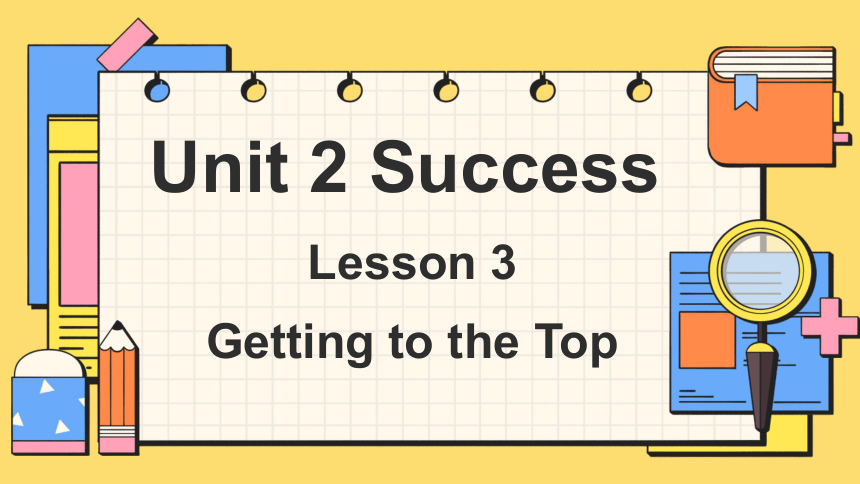
|
|
| 格式 | pptx | ||
| 文件大小 | 2.0MB | ||
| 资源类型 | 教案 | ||
| 版本资源 | 北师大版(2019) | ||
| 科目 | 英语 | ||
| 更新时间 | 2024-10-21 10:50:30 | ||
图片预览


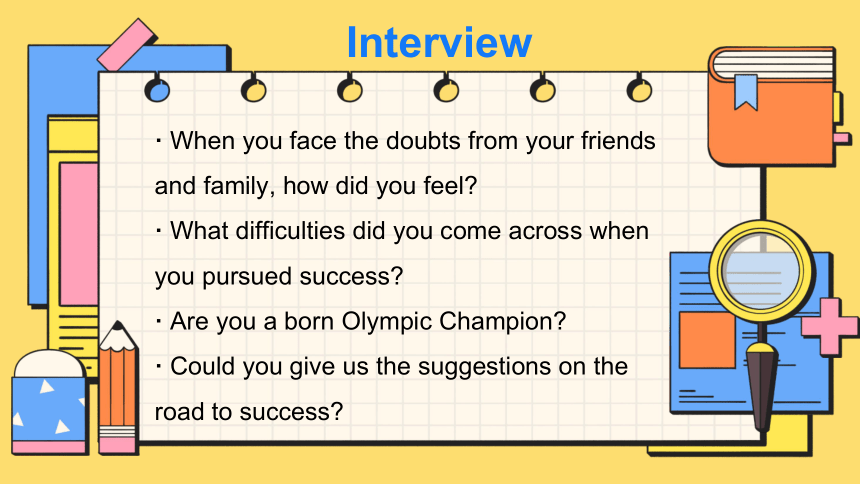
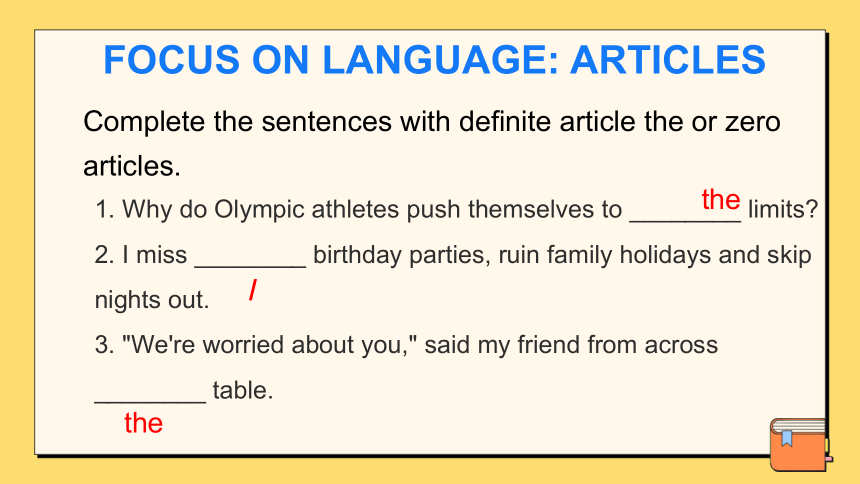
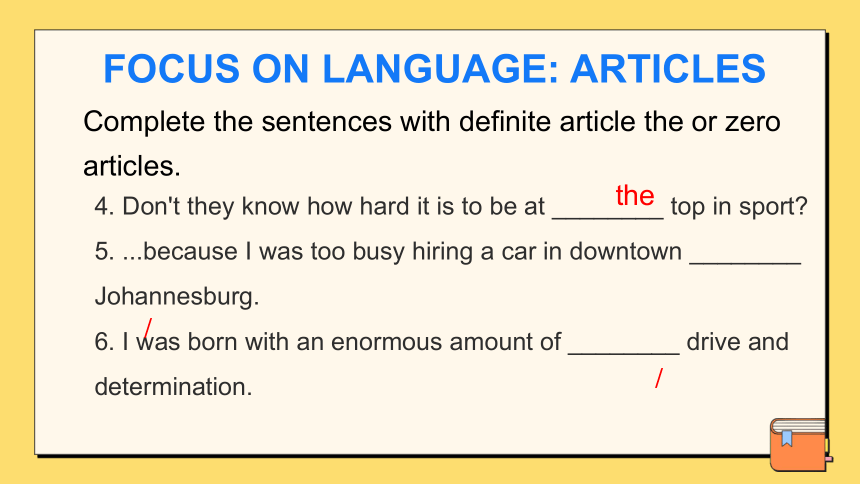
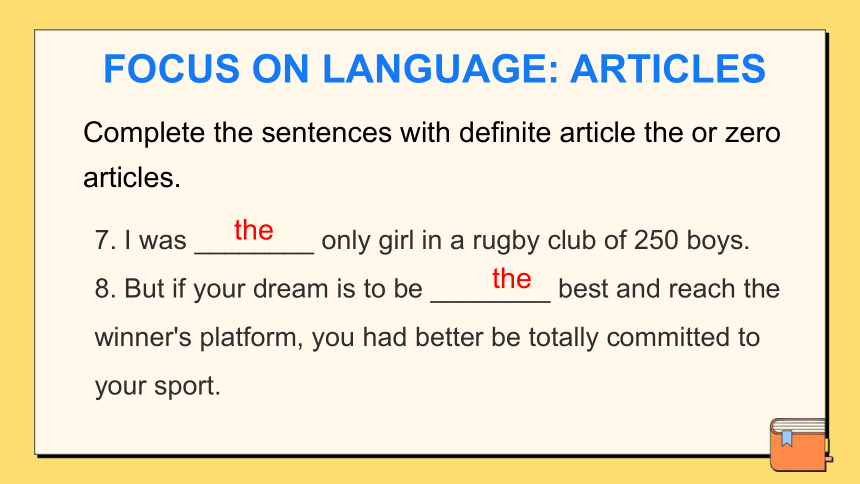

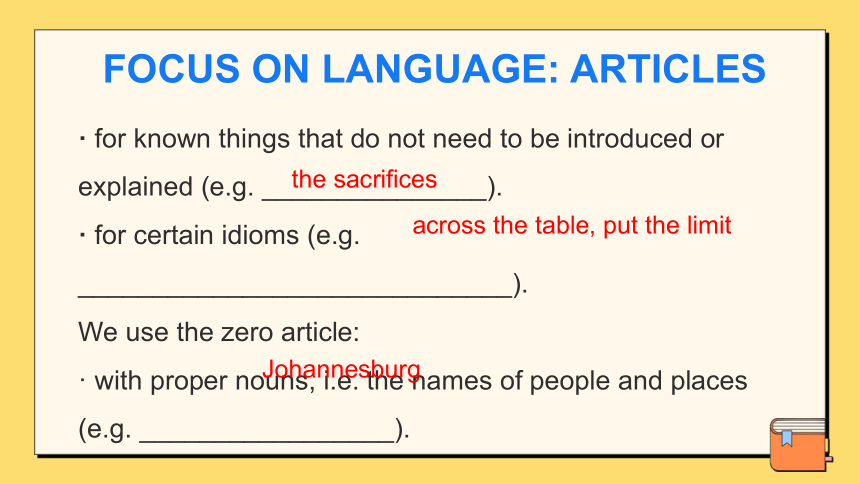
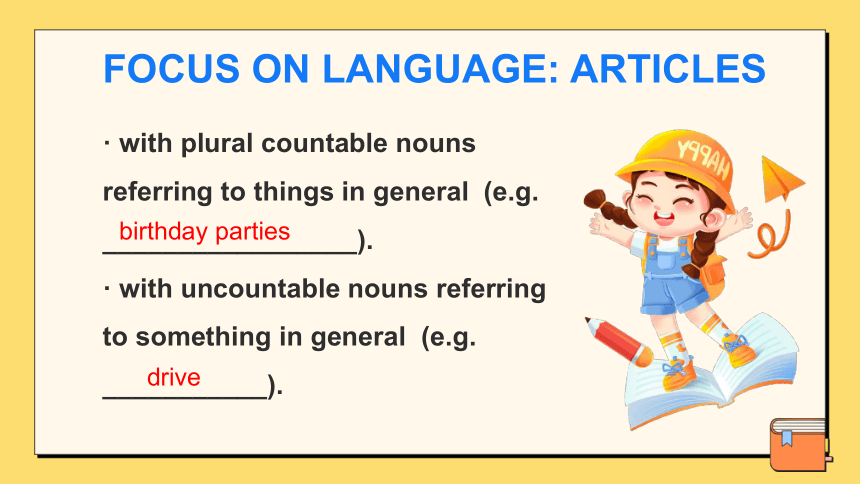
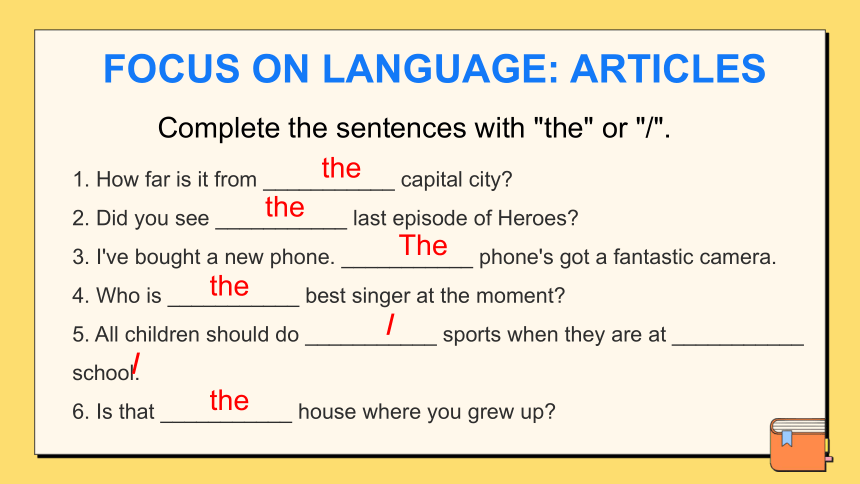


文档简介
(共32张PPT)
Lesson 3
Getting to the Top
Unit 2 Success
Choose the four most important things you need to get to the top. Then rank your choices from 1 (most important) to 4 (least important). Share your list with the other group members. Give reasons for your choices.
intelligence determination patience
mental toughness concentration self-discipline
Group Work
· When you face the doubts from your friends and family, how did you feel
· What difficulties did you come across when you pursued success
· Are you a born Olympic Champion
· Could you give us the suggestions on the road to success
Interview
FOCUS ON LANGUAGE: ARTICLES
Complete the sentences with definite article the or zero articles.
1. Why do Olympic athletes push themselves to ________ limits
2. I miss ________ birthday parties, ruin family holidays and skip nights out.
3. "We're worried about you," said my friend from across ________ table.
the
/
the
Complete the sentences with definite article the or zero articles.
4. Don't they know how hard it is to be at ________ top in sport
5. ...because I was too busy hiring a car in downtown ________ Johannesburg.
6. I was born with an enormous amount of ________ drive and determination.
the
FOCUS ON LANGUAGE: ARTICLES
/
/
Complete the sentences with definite article the or zero articles.
7. I was ________ only girl in a rugby club of 250 boys.
8. But if your dream is to be ________ best and reach the winner's platform, you had better be totally committed to your sport.
the
FOCUS ON LANGUAGE: ARTICLES
the
Find examples for the rules about definite article the and zero articles from the sentences in Activity 10.
We use the definite article the:
· when there is only one of something (e.g. the top).
· when we refer to something unique (e.g. ________________).
· for superlatives (e.g. ___________).
FOCUS ON LANGUAGE: ARTICLES
the only girl
the best
· for known things that do not need to be introduced or explained (e.g. _______________).
· for certain idioms (e.g. _____________________________).
We use the zero article:
· with proper nouns, i.e. the names of people and places (e.g. _________________).
FOCUS ON LANGUAGE: ARTICLES
the sacrifices
across the table, put the limit
Johannesburg
· with plural countable nouns referring to things in general (e.g. _________________).
· with uncountable nouns referring to something in general (e.g. ___________).
FOCUS ON LANGUAGE: ARTICLES
birthday parties
drive
Complete the sentences with "the" or "/".
1. How far is it from ___________ capital city
2. Did you see ___________ last episode of Heroes
3. I've bought a new phone. ___________ phone's got a fantastic camera.
4. Who is ___________ best singer at the moment
5. All children should do ___________ sports when they are at ___________ school.
6. Is that ___________ house where you grew up
FOCUS ON LANGUAGE: ARTICLES
the
the
The
the
/
/
the
GRAMMAR
一、定义
冠词是一种虚词,本身不能单独使用,必须放在名词前面,以帮助说明名词所指的人或事物。冠词分为定冠词,不定冠词和零冠词。
GRAMMAR
二、用法
(一)定冠词
1. 用在表示特指的人或物的名词前。
The book on the desk is mine.
书桌上的那本书是我的。
GRAMMAR
2. 用在姓氏复数前,表示一家人或夫妇二人。
The Chens are going to move to Beijing.
姓陈的一家要搬到北京去。
GRAMMAR
3. 用在表示世纪、年代、朝代的名词前或用在表示方位的名词前。
the Tang dynasty 唐朝
the Spring and Autumn Period 春秋时期
in the 1990's/ 1990s 在20世纪90年代
the south 南方/ 部
GRAMMAR
4. 用在表度量单位的名词前,表示“每一”。
We got paid by the month.
我们按月计酬。
Meat is sold by weight.
肉按重量出售。
GRAMMAR
5. “the+形容词或分词”有时也可以表示类指。
the wounded 伤员
the dying 垂死之人
the unknown 未知的事物
the deaf 耳聋的人
GRAMMAR
6. 用在表示江河海洋、山脉群岛、海湾海峡等的地理名词前。
the Changjiang River 长江
the Thames 泰晤士河
the Nile 尼罗河
the Pacific 太平洋
GRAMMAR
7. 用在序数词或形容词、副词的最高级前。
He is the better of the two.
他是两者中较好的那个。
He was the first to speak against slavery.
他是第一个发表演说反对奴隶制的人。
GRAMMAR
8. 用在西方乐器前。
play the piano 弹钢琴
play the violin 拉小提琴
play the guitar 弹吉他
GRAMMAR
(二)不定冠词
1. 用在第一次提到的人或物前,表泛指。
At that time, I was working in a factory. The factory produces car parts.
那时,我在一家工厂工作。那家工厂生产各种汽车部件。
GRAMMAR
2. 泛指一类人或物,或指同类中的“一个”。
Experts think that the recently discovered painting may be Picasso.
专家们认为最近发现的那幅画可能是毕加索的作品。
GRAMMAR
3. 表示“某一个”,相当于a certain。
There is a Mr. Tom Wilkins on the phone.
有位汤姆·威尔金斯先生打电话来。
GRAMMAR
4. 表示“同一,相同”,相当于the same。
They happen to be of an age and wear clothes of color.
他们碰巧同龄而且穿着同色的衣服。
GRAMMAR
(三)零冠词
1. 不可数名词,复数名词表示泛指时。
My father went to his doctor for advice about his heart trouble.
我父亲去了他的医生那里寻求关于他的心脏病的建议。
GRAMMAR
2. 名词前已有this, that, my, your, some, each, no, any等限定词时。
He went to some place in France.
他到法国某地去了。
Each student must hand in his exercise book.
每个学生必须上交作业本。
GRAMMAR
3. “零冠词+单数名词+as though+主语+谓语+主句”,意为“虽然……,但是……”。
Hero as he is, he has some shortcomings.
他虽然是英雄,但是也有一些缺点。
GRAMMAR
4. 修饰常见的不可数名词。
Beyond the stars, the astronaut saw nothing but space.
除了星星,那个宇航员只看见了太空。
We do not have any more information at the present time.
目前我们没有进一步的消息。
PRACTICE
1. Have you seen ________ red book I put it here just now.
2. Do you know ________ taller of the two students under the tree
3. The film star has got tired of being ________ person who is kept busy all day long.
4. We are all looking for happiness. Can we all find ________ happiness we are looking for
a
the
a
the
PRACTICE
5. How do you like ________ film we saw last night
6. As you know, water is precious, but ________ water here is not fit to drink.
7. Though you failed this time, you can try ________ second time next month.
8. ________ Yellow River is considered to be the mother river of our nation.
the
the
a
The
PRACTICE
9. Mike is ________ third tallest boy in our class.
10. It is hard for a man without knowledge to make ________ living in this world.
11. I enjoy listening to music, but ________ music he is playing is too noisy.
12. It's really ________ great pleasure for me to work with you during this year.
the
a
the
a
PRACTICE
13. ________ International Olympics Committee will come to China next week.
14. I think this is ________ only way to reduce air pollution in our town.
15. This morning ________ Mr. Smith came to see you while you were out.
16. The red army men met all kinds of difficulties in __________ Long March.
The
the
a
the
Thank you
Lesson 3
Getting to the Top
Unit 2 Success
Choose the four most important things you need to get to the top. Then rank your choices from 1 (most important) to 4 (least important). Share your list with the other group members. Give reasons for your choices.
intelligence determination patience
mental toughness concentration self-discipline
Group Work
· When you face the doubts from your friends and family, how did you feel
· What difficulties did you come across when you pursued success
· Are you a born Olympic Champion
· Could you give us the suggestions on the road to success
Interview
FOCUS ON LANGUAGE: ARTICLES
Complete the sentences with definite article the or zero articles.
1. Why do Olympic athletes push themselves to ________ limits
2. I miss ________ birthday parties, ruin family holidays and skip nights out.
3. "We're worried about you," said my friend from across ________ table.
the
/
the
Complete the sentences with definite article the or zero articles.
4. Don't they know how hard it is to be at ________ top in sport
5. ...because I was too busy hiring a car in downtown ________ Johannesburg.
6. I was born with an enormous amount of ________ drive and determination.
the
FOCUS ON LANGUAGE: ARTICLES
/
/
Complete the sentences with definite article the or zero articles.
7. I was ________ only girl in a rugby club of 250 boys.
8. But if your dream is to be ________ best and reach the winner's platform, you had better be totally committed to your sport.
the
FOCUS ON LANGUAGE: ARTICLES
the
Find examples for the rules about definite article the and zero articles from the sentences in Activity 10.
We use the definite article the:
· when there is only one of something (e.g. the top).
· when we refer to something unique (e.g. ________________).
· for superlatives (e.g. ___________).
FOCUS ON LANGUAGE: ARTICLES
the only girl
the best
· for known things that do not need to be introduced or explained (e.g. _______________).
· for certain idioms (e.g. _____________________________).
We use the zero article:
· with proper nouns, i.e. the names of people and places (e.g. _________________).
FOCUS ON LANGUAGE: ARTICLES
the sacrifices
across the table, put the limit
Johannesburg
· with plural countable nouns referring to things in general (e.g. _________________).
· with uncountable nouns referring to something in general (e.g. ___________).
FOCUS ON LANGUAGE: ARTICLES
birthday parties
drive
Complete the sentences with "the" or "/".
1. How far is it from ___________ capital city
2. Did you see ___________ last episode of Heroes
3. I've bought a new phone. ___________ phone's got a fantastic camera.
4. Who is ___________ best singer at the moment
5. All children should do ___________ sports when they are at ___________ school.
6. Is that ___________ house where you grew up
FOCUS ON LANGUAGE: ARTICLES
the
the
The
the
/
/
the
GRAMMAR
一、定义
冠词是一种虚词,本身不能单独使用,必须放在名词前面,以帮助说明名词所指的人或事物。冠词分为定冠词,不定冠词和零冠词。
GRAMMAR
二、用法
(一)定冠词
1. 用在表示特指的人或物的名词前。
The book on the desk is mine.
书桌上的那本书是我的。
GRAMMAR
2. 用在姓氏复数前,表示一家人或夫妇二人。
The Chens are going to move to Beijing.
姓陈的一家要搬到北京去。
GRAMMAR
3. 用在表示世纪、年代、朝代的名词前或用在表示方位的名词前。
the Tang dynasty 唐朝
the Spring and Autumn Period 春秋时期
in the 1990's/ 1990s 在20世纪90年代
the south 南方/ 部
GRAMMAR
4. 用在表度量单位的名词前,表示“每一”。
We got paid by the month.
我们按月计酬。
Meat is sold by weight.
肉按重量出售。
GRAMMAR
5. “the+形容词或分词”有时也可以表示类指。
the wounded 伤员
the dying 垂死之人
the unknown 未知的事物
the deaf 耳聋的人
GRAMMAR
6. 用在表示江河海洋、山脉群岛、海湾海峡等的地理名词前。
the Changjiang River 长江
the Thames 泰晤士河
the Nile 尼罗河
the Pacific 太平洋
GRAMMAR
7. 用在序数词或形容词、副词的最高级前。
He is the better of the two.
他是两者中较好的那个。
He was the first to speak against slavery.
他是第一个发表演说反对奴隶制的人。
GRAMMAR
8. 用在西方乐器前。
play the piano 弹钢琴
play the violin 拉小提琴
play the guitar 弹吉他
GRAMMAR
(二)不定冠词
1. 用在第一次提到的人或物前,表泛指。
At that time, I was working in a factory. The factory produces car parts.
那时,我在一家工厂工作。那家工厂生产各种汽车部件。
GRAMMAR
2. 泛指一类人或物,或指同类中的“一个”。
Experts think that the recently discovered painting may be Picasso.
专家们认为最近发现的那幅画可能是毕加索的作品。
GRAMMAR
3. 表示“某一个”,相当于a certain。
There is a Mr. Tom Wilkins on the phone.
有位汤姆·威尔金斯先生打电话来。
GRAMMAR
4. 表示“同一,相同”,相当于the same。
They happen to be of an age and wear clothes of color.
他们碰巧同龄而且穿着同色的衣服。
GRAMMAR
(三)零冠词
1. 不可数名词,复数名词表示泛指时。
My father went to his doctor for advice about his heart trouble.
我父亲去了他的医生那里寻求关于他的心脏病的建议。
GRAMMAR
2. 名词前已有this, that, my, your, some, each, no, any等限定词时。
He went to some place in France.
他到法国某地去了。
Each student must hand in his exercise book.
每个学生必须上交作业本。
GRAMMAR
3. “零冠词+单数名词+as though+主语+谓语+主句”,意为“虽然……,但是……”。
Hero as he is, he has some shortcomings.
他虽然是英雄,但是也有一些缺点。
GRAMMAR
4. 修饰常见的不可数名词。
Beyond the stars, the astronaut saw nothing but space.
除了星星,那个宇航员只看见了太空。
We do not have any more information at the present time.
目前我们没有进一步的消息。
PRACTICE
1. Have you seen ________ red book I put it here just now.
2. Do you know ________ taller of the two students under the tree
3. The film star has got tired of being ________ person who is kept busy all day long.
4. We are all looking for happiness. Can we all find ________ happiness we are looking for
a
the
a
the
PRACTICE
5. How do you like ________ film we saw last night
6. As you know, water is precious, but ________ water here is not fit to drink.
7. Though you failed this time, you can try ________ second time next month.
8. ________ Yellow River is considered to be the mother river of our nation.
the
the
a
The
PRACTICE
9. Mike is ________ third tallest boy in our class.
10. It is hard for a man without knowledge to make ________ living in this world.
11. I enjoy listening to music, but ________ music he is playing is too noisy.
12. It's really ________ great pleasure for me to work with you during this year.
the
a
the
a
PRACTICE
13. ________ International Olympics Committee will come to China next week.
14. I think this is ________ only way to reduce air pollution in our town.
15. This morning ________ Mr. Smith came to see you while you were out.
16. The red army men met all kinds of difficulties in __________ Long March.
The
the
a
the
Thank you
同课章节目录
- Unit 1 Relationshis
- Lesson 1 Teachers
- Lesson 2 How Do We Like Teachers’ Feedback?
- Lesson 3 So Close,Yet So Fa
- Unit 2 Success
- Lesson 1 Money vs Success
- Lesson 2 Top Five Secrets of Success
- Lesson 3 Getting to the Top
- Unit 3 Conservation
- Lesson 1 The Sixth Extinction
- Lesson 2 War on Plastic Packets
- Lesson 3 The Road to Destruction
